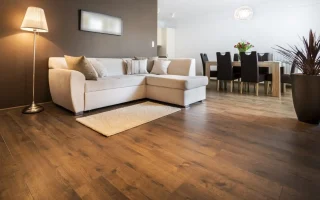Vinyl flooring has become a popular choice for homeowners due to its durability, affordability, and aesthetic versatility. One of the key benefits touted by manufacturers is its ease of maintenance. But the question remains: is vinyl flooring truly washable? In this comprehensive guide, we will explore the properties of vinyl flooring, the best practices for cleaning it, and tips for maintaining its appearance over time.
Understanding Vinyl Flooring

What is Vinyl Flooring?
Vinyl flooring is a synthetic flooring material made primarily from polyvinyl chloride (PVC) combined with various compounds to enhance its durability, flexibility, and aesthetic appeal. It comes in various forms, including sheets, tiles, and planks, each designed to mimic the look of natural materials such as wood, stone, or ceramic.
Types of Vinyl Flooring
- Sheet Vinyl: Large, continuous sheets that are typically installed in one piece.
- Vinyl Tiles: Square tiles that can be arranged in various patterns.
- Luxury Vinyl Plank (LVP): Planks that mimic the look of hardwood floors with added texture and detail.
Properties of Vinyl Flooring
Vinyl flooring is known for several beneficial properties:
- Water Resistance: Vinyl is inherently water-resistant, making it suitable for areas prone to moisture, such as kitchens, bathrooms, and basements.
- Durability: High-quality vinyl can withstand heavy foot traffic and resist scratches and dents.
- Easy Installation: Vinyl flooring is often easier to install compared to other flooring types, with options for peel-and-stick or click-lock systems.
Is Vinyl Flooring Washable?
Water Resistance and Washability
The water-resistant nature of vinyl flooring makes it highly washable. Unlike some other flooring materials that can be damaged by excessive moisture, vinyl can handle regular cleaning with water and mild detergents. This makes it a practical choice for households with children, pets, or high foot traffic.
Cleaning Methods for Vinyl Flooring
Routine Cleaning
- Sweeping: Regularly sweep the floor with a soft-bristle broom to remove dirt and debris. This prevents scratches and keeps the surface looking clean.
- Vacuuming: Use a vacuum cleaner designed for hard floors to pick up fine particles. Avoid using a vacuum with a beater bar, as it can damage the surface.
Wet Cleaning
- Mopping: Use a damp mop with a mild cleaning solution. Avoid soaking the floor with excessive water. Instead, wring out the mop well before use.
- Cleaning Solution: A mixture of warm water and a few drops of dish soap works well for regular cleaning. For a deeper clean, you can use a commercial vinyl floor cleaner.
Stain Removal
Vinyl flooring can resist stains, but certain substances may leave marks if not cleaned promptly. Here are some tips for removing common stains:
- Food and Drink Spills: Wipe up spills immediately with a damp cloth. For stubborn stains, use a mixture of baking soda and water to gently scrub the area.
- Ink and Marker: Use rubbing alcohol on a cloth to remove ink stains. Test on a small area first to ensure it doesn’t damage the finish.
- Grease and Oil: Sprinkle baking soda on the stain and let it sit for a few minutes before wiping with a damp cloth.
Deep Cleaning
Occasionally, vinyl flooring may require a deeper clean to maintain its appearance:
- Heavy-Duty Cleaning Solutions: For tough stains or grime, use a heavy-duty vinyl floor cleaner. Follow the manufacturer’s instructions for dilution and application.
- Steam Cleaning: While steam cleaners can be used on some types of vinyl flooring, it’s important to check the manufacturer’s guidelines first. Excessive heat and moisture from steam cleaning may damage certain types of vinyl.
Maintaining Vinyl Flooring
Preventative Measures
- Use Mats and Rugs: Place mats at entryways to catch dirt and moisture. Use area rugs in high-traffic areas to protect the floor.
- Furniture Pads: Attach felt pads to the bottom of furniture legs to prevent scratches when moving items around.
- Avoid Direct Sunlight: Prolonged exposure to direct sunlight can cause vinyl flooring to fade. Use blinds or curtains to protect the floor.
Repairing Damage
- Scratches: Minor scratches can often be repaired using a vinyl floor repair kit. For deeper scratches, consider replacing the affected tile or plank.
- Dents: Heavy furniture or dropped objects can cause dents in vinyl flooring. Use floor protectors and avoid dragging heavy items across the floor.
Regular Maintenance Tips
- Consistent Cleaning Routine: Establish a regular cleaning schedule to keep the floor looking its best.
- Avoid Harsh Chemicals: Do not use abrasive cleaners, ammonia, or bleach, as these can damage the vinyl surface.
- Immediate Spill Cleanup: Address spills and stains immediately to prevent permanent damage.
Advantages of Washable Vinyl Flooring
Hygienic and Allergen-Free
Regular washing and cleaning of vinyl flooring contribute to a hygienic living environment. Unlike carpets, vinyl does not trap dust, allergens, or pet dander, making it a healthier option for individuals with allergies.
Cost-Effective Maintenance
Vinyl flooring’s ease of cleaning and maintenance makes it a cost-effective option. There is no need for specialized cleaning products or professional services, which can save homeowners money in the long run.
Versatility and Aesthetic Appeal
With a wide range of styles, colors, and patterns available, vinyl flooring can complement any interior design. Its washability ensures that it remains visually appealing with minimal effort.




